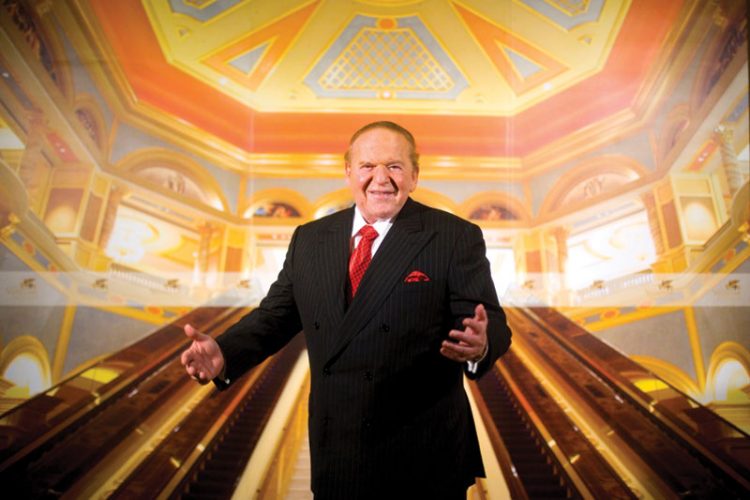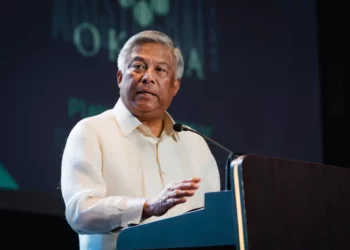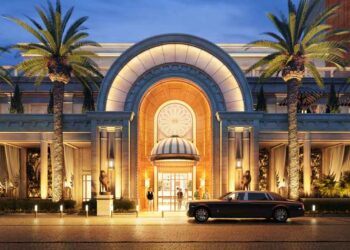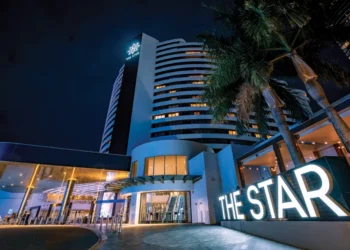[Ed: The gaming world was met with the sad news of the passing of Las Vegas Sands Chairman and CEO Sheldon Adelson overnight (Las Vegas time). Read our obituary of the visionary gaming figure who singled-handed changed our industry, and for the better.]
After making millions in Vegas, Macau and Singapore propelled Adelson to global power and otherworldly wealth
Sheldon Adelson lived the American dream, from sleeping on a tenement floor as a child to revolutionizing Las Vegas with Venetian and the convention driven business model, becoming a multimillionaire in the process. For most people that would have been enough. But the Las Vegas Sands founder produced a more spectacular second act in Asia.
In his 70s and 80s, Adelson led Macau’s transformation from what he called “a seedy backwater” to the world’s leading casino destination, far surpassing the Las Vegas Strip’s gaming revenue. That transformation was centered on Adelson’s brainchild, the Cotai integrated resort hub. In Singapore, Adelson developed Marina Bay Sands, the industry’s most admired integrated resort and in most years its most profitable. Asia made Adelson wealthier faster than anyone in human history, elevating him to the leading figure in early 21st century gaming and a political kingmaker in the US and Israel.
From humble beginnings, he placed 28th on the Forbes 2020 billionaires list with a fortune of US$26.8 billion – surviving in the process a bout of non-Hodgkin lymphoma that sidelined him for much of 2019, only to bounce back at age 86.
“Mr Adelson cemented his place in the gaming industry well before LVS landed a license in Macau and Singapore,” Global Market Advisors Government Affairs Director Brendan Bussmann said. Bussmann worked in a similar position for LVS and, like many past and current Sands employees, refers to the founder as Mr Adelson. “He fundamentally changed the paradigm in Las Vegas.”
Thomas Arasi, who presided over the opening of Marina Bay Sands, recalls Adelson telling him, “I don’t look at businesses the way everybody else does. I look at businesses in a different way and figure out how to make it better, bigger and more valuable.”
Arasi, now President and COO of Bloomberry Resorts and its Solaire Resort and Casino in Manila, added, “Sheldon’s move to bring unprecedented scale in MICE and retail and non-gaming can only be characterized as incredibly courageous … he was truly the trailblazer.”
Adelson’s integrated resort concepts arose from travel industry experience. By his own estimate, Adelson owned and operated some 300 businesses in a career that began hawking newspapers on Boston street corners; he later owned the most read papers in Las Vegas and Israel. From vending machines to windshield de-icer spray, Adelson bounced into the travel and tour business; decades later, the college dropout could pull an Asian city’s Chamber of Commerce directory out of his desk and give visiting executives a master class on group sales.
BIGGEST IN VEGAS
Captivated by the markup on exhibition floor space, Adelson – who never used a computer – launched personal computer industry trade show Comdex in Las Vegas, the largest MICE event in Vegas by the late 1980s. But Adelson resented the treatment he received from Strip hotels. Even though he was “their biggest customer,” Adelson complained in an interview about hotel contracts that reserved the right to cancel bookings if another event, say a big boxing match, could fill those rooms with gamblers instead of conventioneers. So Adelson bought the Sands hotel, once the redoubt of Frank Sinatra and the Rat Pack, in 1988 for US$128 million.
Adelson built Sands Expo and Convention Center and, inspired by honeymooning in Venice with his second wife, Israeli physician Miriam Adelson (formerly Ochshorn), commissioned the Venetian.
“He and Miriam moved forward in the face of lots of industry skepticism. They never took their eyes off the ball and pushed everyone on the project team in every aspect,” The Innovation Group founder Steve Rittvo, a consultant on the Venetian, said.
Opened in 1999, the US$1.5 billion Venetian became the Strip’s largest property with 3,000 suites – the 1,013 suite Venezia Tower added in 2003 made it the world’s largest hotel for a time. A 120,000-square foot (11,160 square meter) casino and 500,000 square foot shopping mall was attached to its 2.25 million square foot convention center.
Venetian’s location facing Mirage with its erupting volcano fueled a public feud between Adelson and Mirage founder Steve Wynn. The rough edged, dyspeptic Adelson and perfectly coiffed Ivy Leaguer Wynn presented a textbook contrast, but the frenemies were both Vegas iconoclasts who bucked gaming’s corporatization trend and upset the status quo. Wynn overturned the cheap rooms and buffets model in favor of luxury; Adelson built on that foundation to add conventions. Their rivalry was destined to span the Pacific.
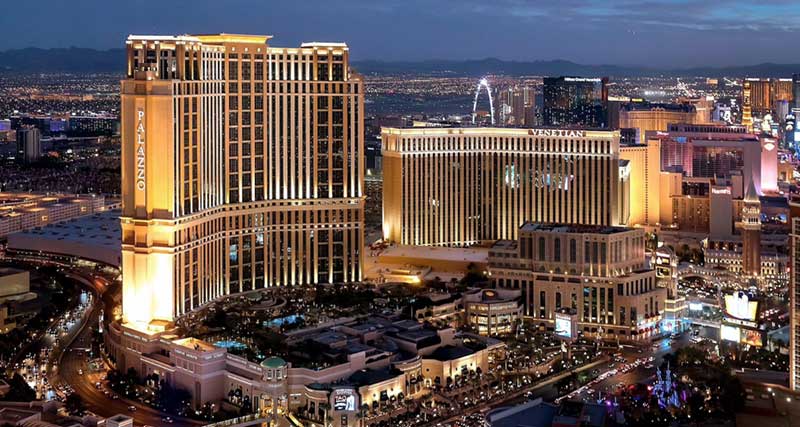
PURSUING MACAU
When Portugal’s colonial regime left Macau in December 1999, the new China-endorsed administration proposed casino liberalization, ending Stanley Ho’s gaming monopoly. Initially skeptical, LVS became an enthusiastic suitor, even though Adelson described the city as “a seedy backwater of a gambling den. It was prostitution infested, crime infested, triad infested. Everything that you don’t want a gaming destination to be … was going on in Macau.”
Much about LVS’ early efforts in Macau emerged through its 15-year legal dispute with consultant Richard Suen over his contribution to those efforts. LVS appealed Nevada jury awards to Suen of US$44 million in 2008 and US$70 million in 2013. The parties settled on undisclosed terms after one day of testimony in a third trial in March 2019.
Suen helped LVS meet Beijing leadership in July 2001, and Adelson was shocked by assurances from Vice Premier Qian Qichen that China would allow more mainlanders to visit Macau. In response, LVS told China it had flexed its Washington muscle to stop a Congressional resolution against Beijing’s 2008 Olympic bid, though in fact the legislative calendar, not LVS, scuttled the vote. Then a combination of bad luck and bad judgment nearly scuttled Adelson’s Macau dream.
Returning from Beijing, Adelson showed symptoms of peripheral neuropathy, a neuromuscular disorder that made it difficult for him to stand and walk. Treatment left him incapable of working effectively – “a little coo-coo,” he said – for six months, including the late 2001 Macau gaming license tender period. LVS then-President and COO William Weidner took the lead on Macau.
The September 11, 2001 attacks on the US devastated Las Vegas revenue. So LVS needed a finance partner to post Macau’s required US$500 million guarantee. It chose Taiwan’s China Development Bank, finance arm of the Kuomintang party, Beijing’s avowed foe – which some saw as a stunning blunder.
SHOTGUN MARRIAGE
The Macau government’s Tender Commission reviewing casino concession applicants liked the LVS proposal for a temporary casino and a new Venetian with its convention model, but rejected its Taiwan partner. So Macau elders brokered a partnership between LVS and Hong Kong magnate property Lui Che Woo’s newly formed Galaxy Entertainment. In what was seen as an upset, the LVS-Galaxy team won a concession in February 2002, along with Steve Wynn and Stanley Ho’s SJM, over more established Vegas names such as MGM Mirage and Caesars.
When Adelson had resumed work, Weidner convinced him of Macau’s extraordinary potential. The partnership agreement called for total investment of US$1.1 billion, Galaxy providing the capital, LVS receiving management fees and an option to acquire 30% of the project. Adelson pushed to spend faster than Galaxy wanted, and the Hong Kong company tired of Nevada regulators’ disclosure requirements. Meanwhile, a post-9/11 rebound in Vegas gave LVS means to fund Macau itself.
Approaching the government’s deadline for a formal partnership agreement, LVS and Galaxy sought a split. Whether the two sides really were irreconcilable or Adelson simply wouldn’t settle for 30% of the Macau goldmine can never be known. As government officials scrambled to find a solution, LVS produced an ace in the hole.
“Thank you for the land, but I can’t find it,” Adelson asked after seeing Cotai, the swampy site officials offered for The Venetian Macao. In 2002, the unfinished landfill joining Macau’s outer islands Taipa and Coloane was a 5.8 square kilometer (2.2 square mile) white elephant. Joking aside, Adelson saw Cotai’s potential to host not just Venetian but a local version of the Las Vegas Strip. Some believe Adelson offered developing Cotai as leverage with Macau authorities in the Galaxy dispute.
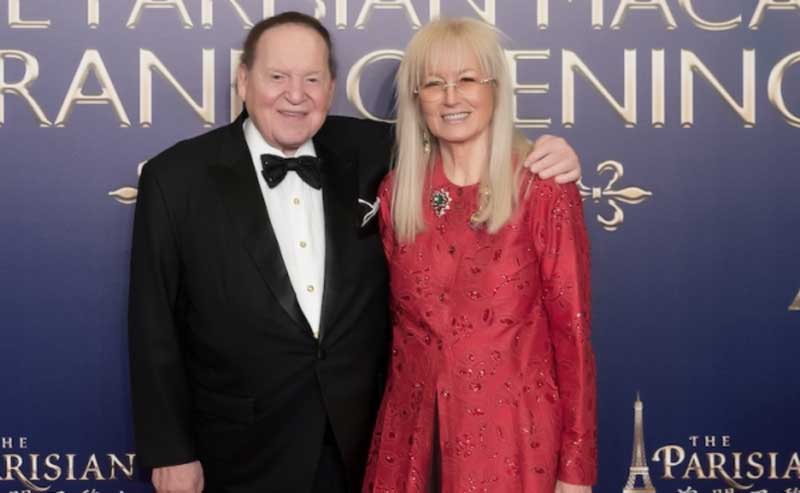
SPLITTING THE BABY
Unwilling to lose Adelson’s convention and development ambitions or remove the only new ethnic Chinese concessionaire, Macau authorities found the device of a subconcession to allow LVS and Galaxy to operate independently. Going solo, Adelson turned the temporary casino into Sands Macao, opened in May 2004 as the largest casino in the world. Without hotel rooms, junket promoters or stores and with six money-losing restaurants, Sands Macao earned back its entire US$265 million development cost in six months. Some two dozen banks financed the project, eager for a piece of Adelson’s next deal.
Sands Macao fueled a New York Stock Exchange listing for LVS in December 2004. Adelson retained a majority stake, and over the next two years, his wealth increased at a record rate approaching US$1 million an hour (when the 2008 global financial crisis hit, Adelson’s wealth declined at a record rate, but he remained sufficiently flush to provide a US$1 billion loan to keep LVS afloat and defeat Weidner’s boardroom coup).
During those same two years, Macau overtook the Vegas Strip in gaming revenue. Operating in the former Portuguese colony drew a bright line between commercial casino industry haves and have-nots: Caesars Entertainment, Trump Casinos and Harrah’s, leading US gaming names before Macau, wound up bankrupt.
Opening US$2.7 billion The Venetian Macao in 2007 began the process of moving Macau’s center of gaming gravity from the peninsula to Cotai. Relatively plentiful land enabled development of more non-gaming amenities that had boosted LVS in Las Vegas and established its lead in the most profitable mass market segment. Investing US$13 billion, LVS subsidiary Sands China built 13,000 guest rooms – matching its rivals’ combined total – representing seven hotel brands, 800 retail shops, five casinos with more than 1,300 tables and 5,000 machines, a 15,000-seat arena, two theaters, 150,000 square meters of MICE space and two faux European cities – Parisian Macao opened in 2015 – with a third, Londoner, in the works.
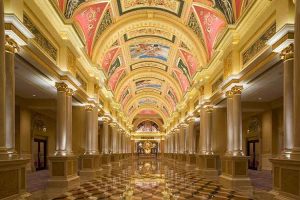
Sands Macao also set the stage for Adelson’s 2006 victory in the global competition for Singapore’s coveted Marina Bay integrated resort license. In 2010, LVS rewarded Singapore’s faith with Marina Bay Sands, the prototype 21st century integrated resort, an urban icon that remade the Lion City’s stodgy image with its infinity pool 57 stories in the sky. MBS has more than a million square feet of MICE space, and unlike Macau, Adelson’s convention-based IR model works in Singapore.
In Macau, though, the conventions washout hardly mattered, given its location on the doorstep of China’s manufacturing center Guangdong Province, and global finance center Hong Kong.
“Imagine if Las Vegas had been located between in New York and Detroit in the 1960s,” an associate recalled Adelson saying. “That’s Macau.”
It would be wrong to sanctify Sheldon Adelson after his passing. He was renowned as a tough leader, a driven entrepreneur whose sometimes abrasive manner didn’t endear him to all, yet undoubtedly earned the respect of most. Certainly he was a visionary, a man credited not only with reimagining Las Vegas as a leading convention destination but with transforming Asia’s aging casino town of Macau into the undisputed heavyweight champion it remains to this day. He led an incredible life that few of us could ever even dream of, let alone aspire to. Without him, Macau and Las Vegas (and the IRs of Singapore) would be mere shadows of what they are today. The legacy of Sheldon G Adelson is set to live long into the future.
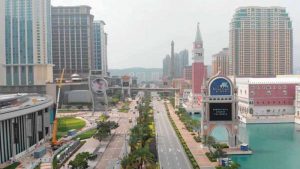
ADELSON’S ASIA EDUCATION
Importing Venetian and its convention-centric business model from Las Vegas to Asia led many to believe Sheldon Adelson didn’t understand the region that made him a multibillionaire. There’s no doubt Adelson faced a steep learning curve in Asia, but there are signs he learned.
LVS showed stunning naivety when it chose China Development Industrial Bank (CDIB), the financial arm of Taiwan’s Kuomintang party, as its Macau partner during the 2001 bidding process. Consultant Richard Suen warned against working with an enemy of China’s Communist Party, and Macau authorities vetoed CDIB but wanted LVS enough to facilitate a new partnership.
Bidding in Singapore in 2005, Adelson seemingly absorbed lessons from Macau. After a cool reception to its initial Marina Bay design, LVS enlisted architect Moshe Safdie, director of Harvard University’s urban design program, where several senior Singapore planning officials studied.
Additionally, LVS transferred George Tanasijevich, a former executive at Singapore’s CapitaLand, partially owned by the government, from Venetian Macao construction to Singapore to lead the local team. For Singapore authorities, Safdie and Tanasijevich lent credibility to an unprecedented design – a trio of 57 story towers topped with a one hectare (2.5 acre) deck – from a bidder that had completed exactly one casino resort to date.
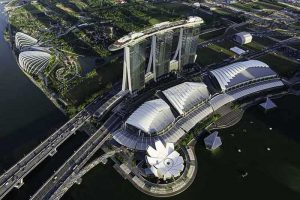
NO SALE
In Macau, proposed LVS residential sales in Cotai produced friction. In August 2008, LVS opened the Four Seasons complex next to The Venetian Macao, including a 30-story tower with 300 units that LVS repeatedly stated were intended for sale as serviced apartments. But upon their completion, authorities objected to apartment sales.
No Macau native holds a gaming concession and other industries have atrophied. Adelson led the way for casino licensees to dominate retail. The one major segment where Macau’s elite can still reap large scale profits handsomely is property. Moreover, for many Macau families, home ownership represents their main asset. Keeping casinos out of the residential property market mattered to key Macau constituencies.
Weeks after the Four Seasons opening, the global economic crisis threatened LVS with bankruptcy. Frozen credit markets meant LVS couldn’t borrow to continue building on Cotai Lots 5 and 6, so it stopped construction, idling thousands of construction workers. Global turmoil coincided with mainland restrictions on visas to Macau, slowing casino revenue and hiring. That combination created the first hard times in Macau since Sands Macao’s 2004 opening. Residents particularly noticed local layoffs while LVS continued building Singapore’s Marina Bay Sands, which, unlike the Macau project, had been fully financed in advance.
NO DEAL
In June 2010, Adelson recounted that former Macau Chief Executive Edmund Ho had agreed to let LVS sell the Four Seasons apartments if LVS floated its Sands China subsidiary on the Hong Kong stock market and restarted work on Lots 5 and 6 – conditions met by November 2009 – but Ho’s successor Fernando Chui said no to the deal. Chui’s government responded by canceling the provisional grant of Cotai Lots 7 and 8 to Sands. Then a raid nabbed dozens of prostitutes at The Venetian Macao while Adelson was visiting the property. Efforts to recover the lots at the south end of Cotai’s main spine, on which LVS claims it spent more than US$100 million on site preparation, proved unsuccessful.
Eventually, relations warmed between Adelson and Chui, who received his PhD in the US. At the opening of Sands Cotai Central in 2012, Chui and Adelson chatted amiably on stage. The US$4.4 billion project on Lots 5 and 6 included another 300 serviced apartments units Adelson aimed to sell under the St Regis brand.
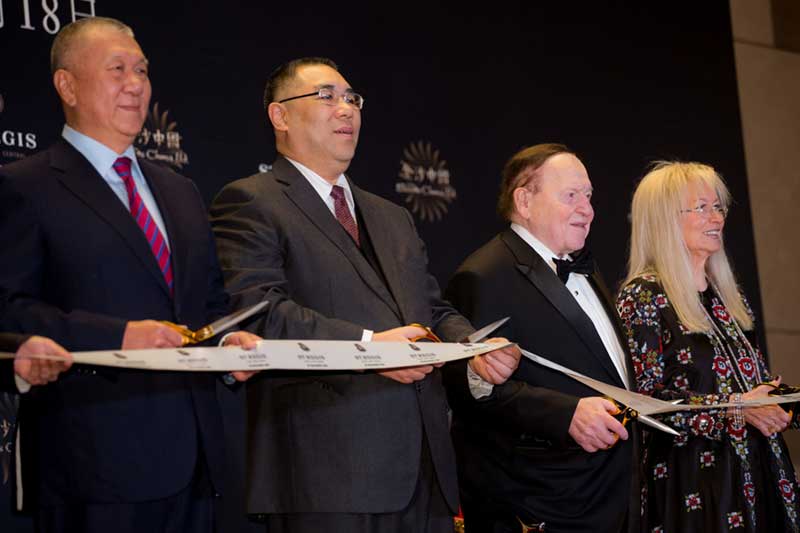
In 2013, the government granted Sands China permission to sell the Four Season apartments if buyers purchased shares in the building’s corporate owner rather than a physical unit. The agreement required licensing by the Macau Government Tourist Office, government approval of each sale and reserving some units for walk-in guests. Analysts estimated unit sale revenue upwards of US$700 million.
But for more than four years, no sales were reported. In October 2017, Sands China announced it would convert Sands Cotai Central into Londoner Macao, a themed resort based on the British capital, centerpiece of a US$2.2 billion capital investment program. Changes include converting the Four Seasons and St Regis serviced apartments into hotel suites, ending the quest to sell the units. It seems that after more than 15 years in Macau, Adelson had begun to understand Asia.
POWER COUPLE
Enormous wealth made Sheldon and Dr Miriam Adelson key political players in the US and Israel.
Adelson grew up supporting US Democrats but “the party left me,” he wrote in a 2012 Wall Street Journal op-ed. However, he staunchly opposed unionization at the Venetian, whereas Democrats traditionally back unions. When he got wealthy, Adelson embraced the Republican gospel of low taxes.
From the 2008 election cycle, the Adelsons contributed tens of millions of dollars to Republican candidates, pledging US$100 million to campaigns in 2012, 2016, 2018 and 2020. Many saw the Adelsons motivating Donald Trump’s decision to relocate the US embassy in Israel to Jerusalem.
Dr Adelson, born Miriam Farbstein in Tel Aviv in 1945 under British Mandate, is often seen as the driving force of Adelson’s staunchly pro-Israeli outlook. However, Adelson traced his Jewish identity to his childhood home with a pushke, a charity box where his father, a Boston taxi driver eking out a living during The Great Depression, deposited a few coins a week for those “worse off than we are.”
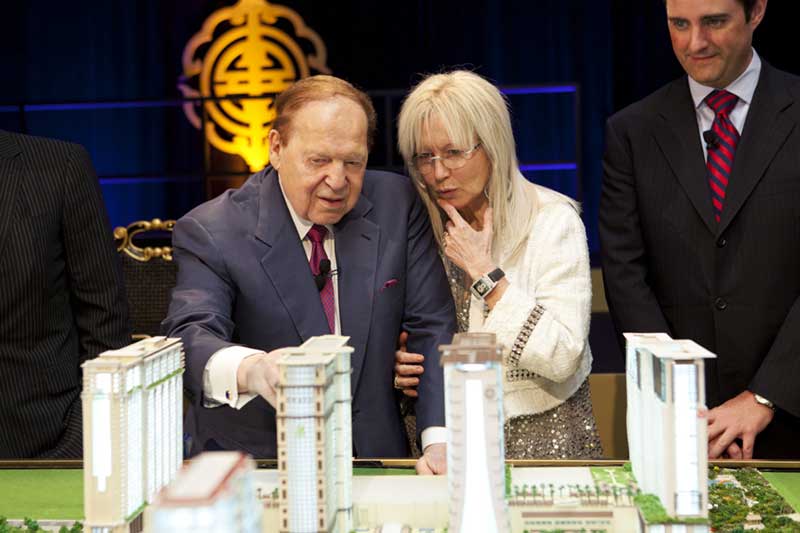
On his first visit to Israel, Adelson wore a pair of his father’s shoes. The Adelsons donated hundreds of millions of dollars to Jewish and Zionist causes, including the Yad Varshem Holocaust Memorial, Taglich-Birthright Israel sponsoring trips to Israel for American Jewish adolescents, and an Israeli American school near their Nevada home that their two sons attended.
In 2007, the Adelsons launched Israel Hayom, a free daily that quickly achieved the nation’s top circulation. Hayom supported their hard right political stance, opposing a Palestinian state and promoting settlements in the occupied territories. The family has reportedly invested more than US$50 million in the newspaper that long supported Likud leader Benyamin Netanyahu. Sivan Dumont, the younger of Dr Adelson’s two daughters from her first marriage, is reportedly active in Hayom, and in 2018, Dr Adelson was named its publisher.
In 2015, the Adelsons acquired Nevada’s high circulation newspaper, the Las Vegas Review-Journal, in a deal orchestrated by Patrick Dumont, Sivan Dumont’s husband, then a LVS senior vice president, now its CFO. The Adelson motive may have been more friendly coverage – and some writers critical of LVS left in the wake of the deal – as well as more political clout. The Las Vegas Review-Journal was the only major US paper to endorse Donald Trump for President in 2016, but Trump lost the state of Nevada.
The Adelsons also funded anti-drug efforts. Dr Adelson specializes in anti-addiction treatment and has been active in clinics in Israel and the US. Long an addict, Adelson’s eldest son from his first marriage, Mitchell, died of an overdose in 2005.
Adelson had two sons and a daughter from that marriage. Mitchell and brother Gary unsuccessfully sued Adelson over his redemption price for their shares in the Comdex computer trade show, which was sold for a substantially higher valuation soon after. Their sister Shelley’s husband worked with LVS, continuing long after the couple divorced.
Behind Adelson’s tough exterior lay countless untold stories of serious philanthropy and largesse. When the global pandemic impacted Las Vegas, Macau and Singapore, Adelson insisted Sands’ team members across the globe continue to receive full pay and health care insurance. While many of his philanthropic and even nation-building efforts are well known, there are many more for which he may only receive recognition as history unfolds. Adelson exhibited a true commitment to philanthropy and love of his family, and he will be sorely missed by many across the planet.






